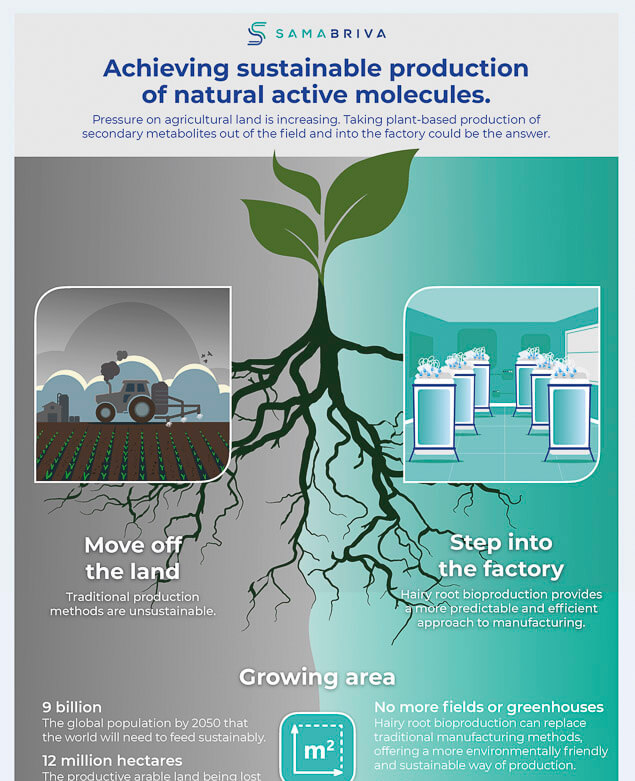Infographic: Achieving sustainable production of natural active molecules
Our latest infographic brings together an extensive collection of fascinating facts and statistics about the production of natural active molecules and compares traditional field-based production and new bioproduction methods.
Current challenges
Active natural molecules (secondary metabolites)
The challenges ahead
API production is facing rising costs alongside unpredictable pressures such as climate change, the need to use land for food production and geopolitical uncertainty. To help you find out more about these challenges and other issues, we’ve collated these thought-provoking articles.
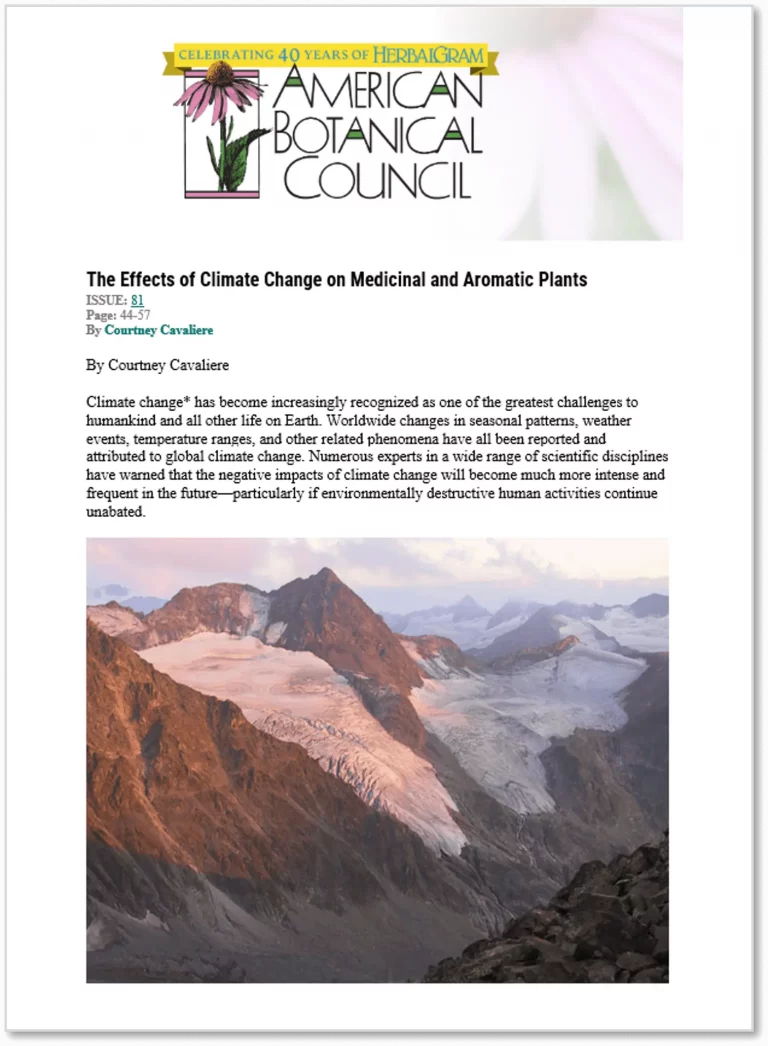
The Effects of Climate Change on Medicinal and Aromatic Plants
Published by the American Botanical Council, this article looks into the impact of climate change on medicinal plants. Studies have demonstrated that increases in temperature could impact their medicinal activity which has implications for drug production.
https://www.herbalgram.org/resources/herbalgram/issues/81/table-of-contents/article3379/
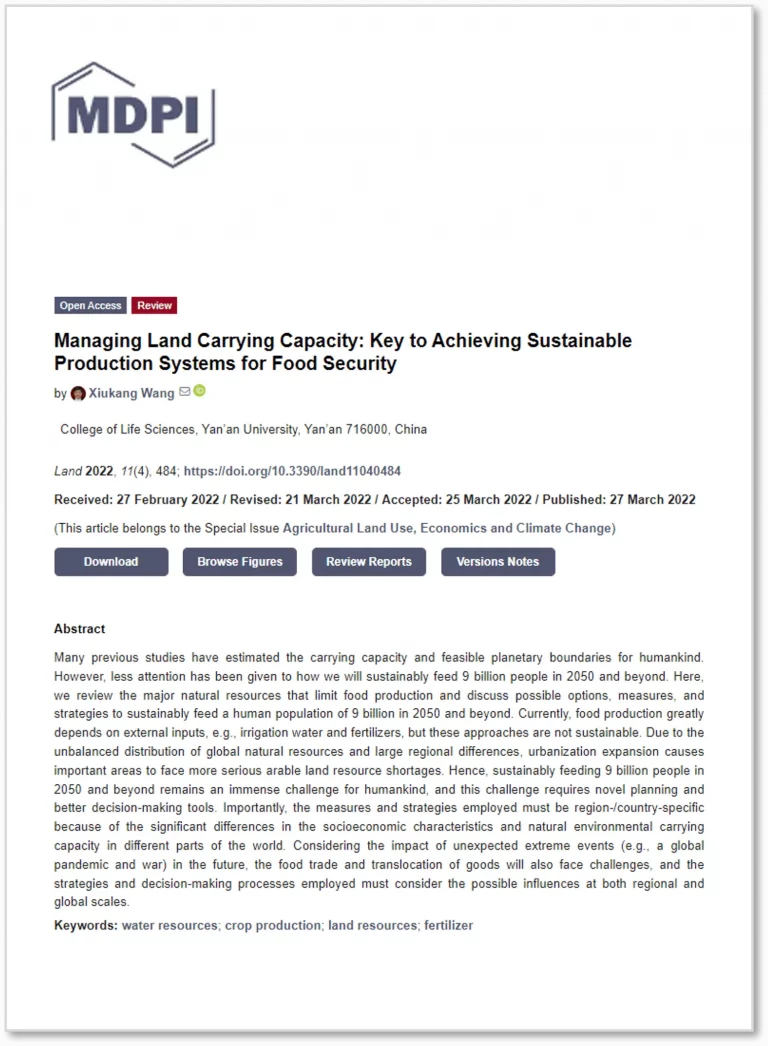
Managing Land Carrying Capacity: Key to Achieving Sustainable Production Systems for Food Security
March 27 2022
How will the planet sustainably feed nine billion people in 2050 and beyond? Published by MDPI, this article looks at the environmental challenges ahead such as increasing food production while reducing the use of fertilizers. Non-food crops may encounter challenges as the demand for agricultural land dedicated to food production continues to rise.
https://www.mdpi.com/2073-445X/11/4/484
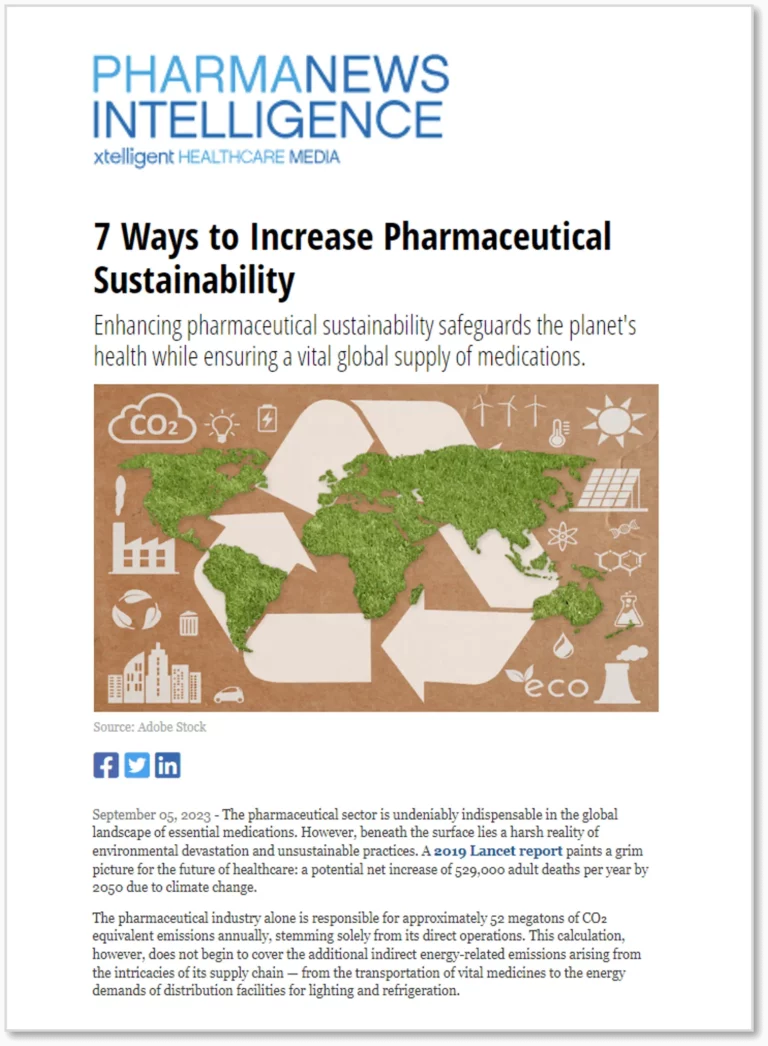
7 Ways to Increase Pharmaceutical Sustainability
September 05 2023
While it’s crucial that the pharmaceutical industry continues to supply medications globally, it also needs to safeguard the planet’s health. Published by Pharma News Intelligence this article looks at ways to increase pharmaceutical sustainability, such as choosing technologies that can help preserve biodiversity and natural ecosystems.
https://pharmanewsintel.com/features/7-ways-to-increase-pharmaceutical-sustainability#:~:text=Sustainable%20Sourcing,alternatives%20to%20non-renewable%20resources
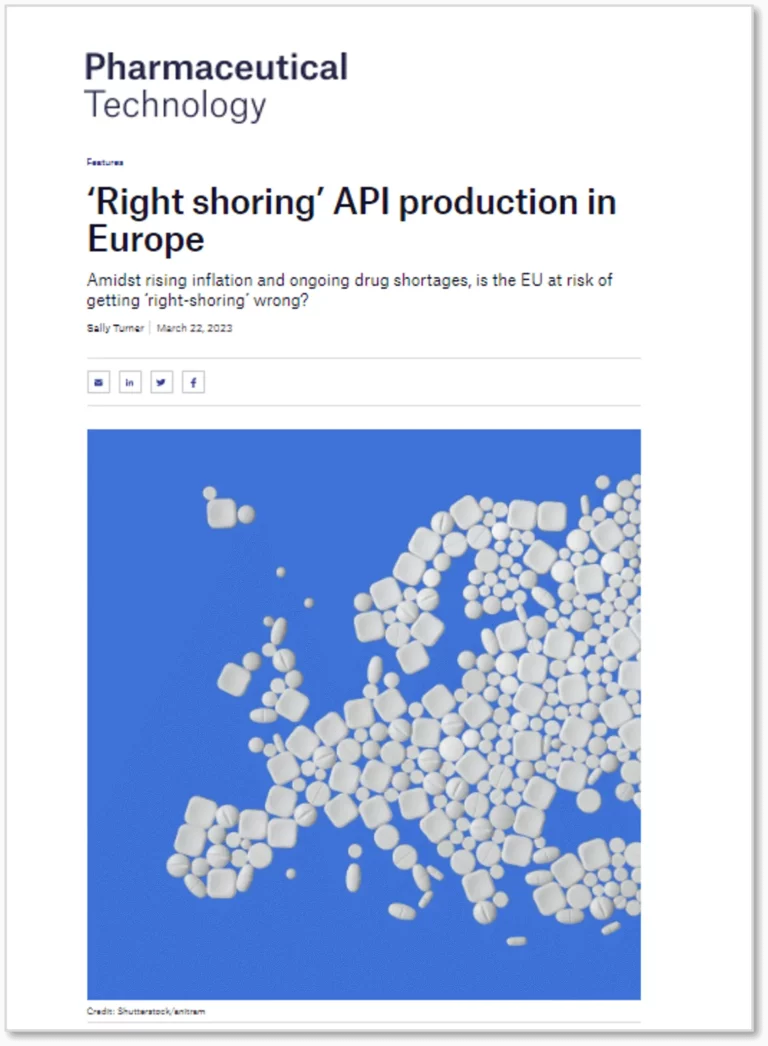
‘Right shoring’ API production in Europe
22 March 2023
By 2020, only 25% of API production for generic drugs took place in Europe. When Covid-19 hit, EU countries experienced drug shortages as the global supply chain stuttered. Published by Pharmaceutical Technology, this article looks at the current trend in the pharmaceutical industry to shift back to regional suppliers.
https://www.pharmaceutical-technology.com/features/right-shoring-api-production-in-europe-2/
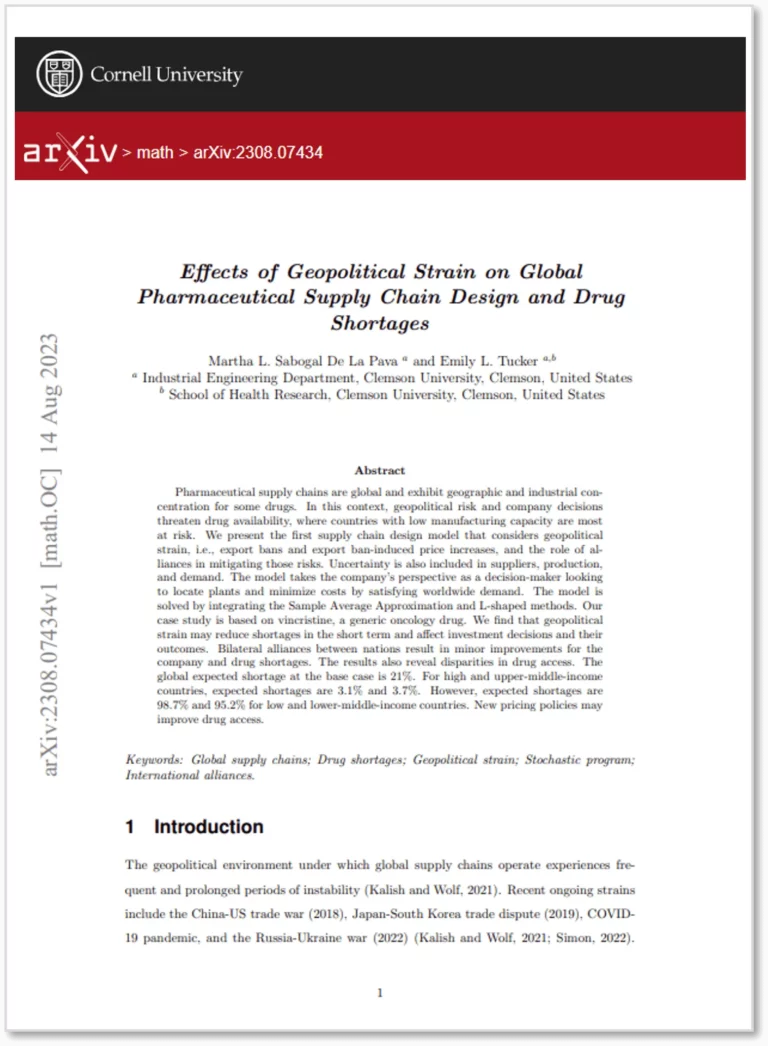
Effects of Geopolitical Strain on Global Pharmaceutical Supply Chain Design and Drug Shortages
August 14 2023
Uncertainty in the pharmaceutical industry’s supply chain will increasingly impact drug availability in the decades ahead. Published by Cornell University, this article looks at the causes, such as geopolitical instability.
https://arxiv.org/abs/2308.07434

Geopolitical tensions expected to increase to 2050
August 11 2023
How will geopolitical instability impact the pharmaceutical industry in future decades? This article in Engineering News explores the risks. One major concern is that climate change will increase disputes between countries over natural resources.
https://www.engineeringnews.co.za/article/geopolitical-tensions-expected-to-increase-to-2050-2023-08-11
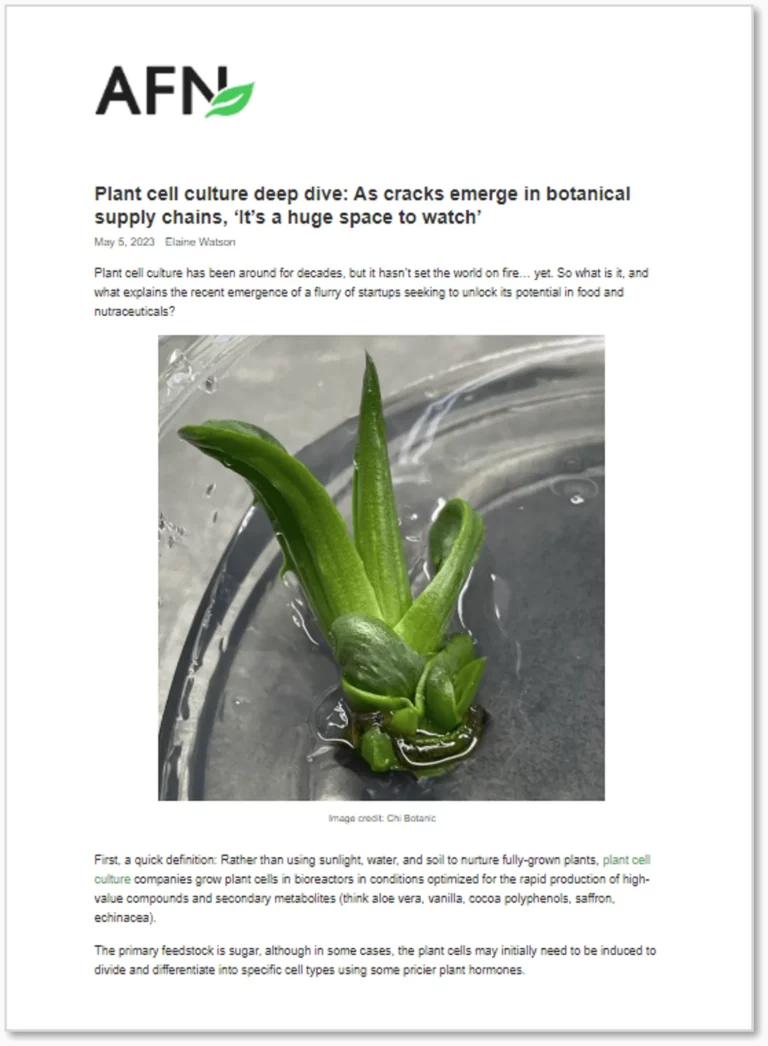
Plant cell culture deep dive: As cracks emerge in botanical supply chains, ‘It’s a huge space to watch’
May 5 2023
For companies like Samabriva at the cutting-edge of plant cell culture these are exciting times. According to this article published by AgFunder News, the sustainability, stability and consistency of growing plants in a bioreactor are increasingly compelling for the pharmaceutical industry
https://agfundernews.com/plant-cell-culture-ready-for-prime-time-in-food-and-nutraceuticals

What the experts have to say
We interviewed experts to understand what they believe will happen to API production in the coming years.
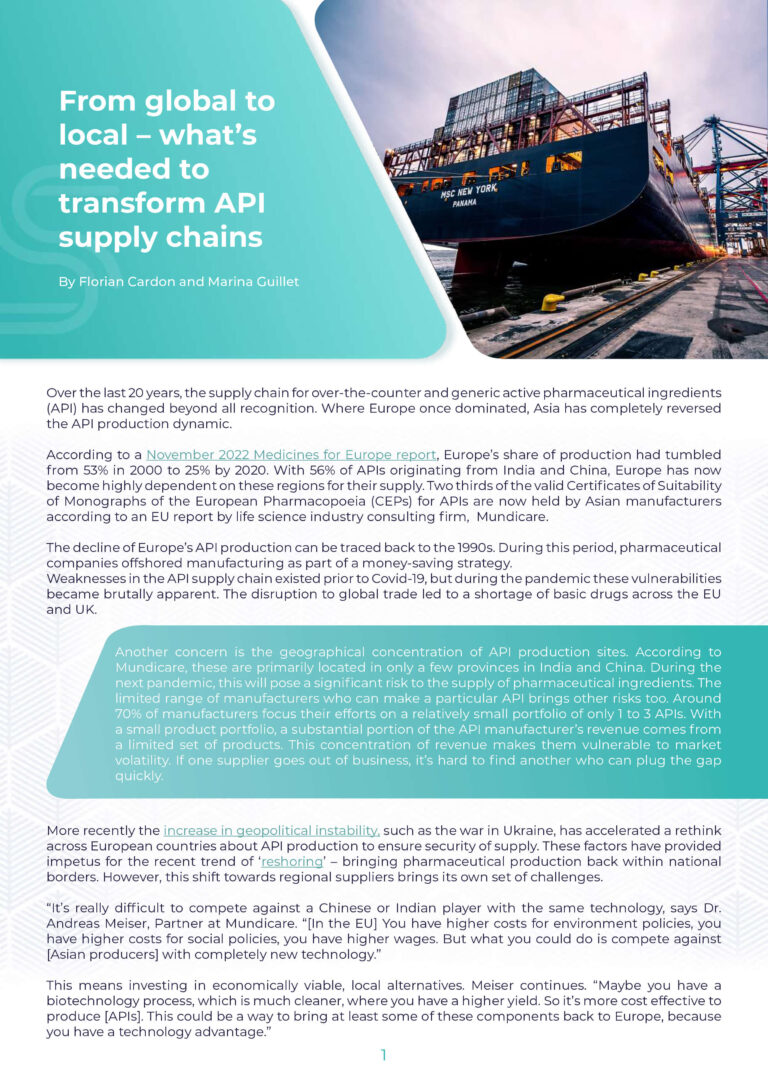
From global to local – what’s needed to transform API supply chains
21 November 2023
Over the last 20 years, the supply chain for over-the-counter and generic active pharmaceutical ingredients (API) has changed beyond all recognition. Where Europe once dominated, Asia has completely reversed the API production dynamic.
However, if production is to return to Europe cost inequalities between the US and EU and Asia need to be addressed. Adopting new technologies that offer economically viable, local alternatives will be crucial.
https://samabriva.com/wp-content/uploads/2023/11/Risks-to-the-API-supply-chain_v0.5_clean_compressed.pdf
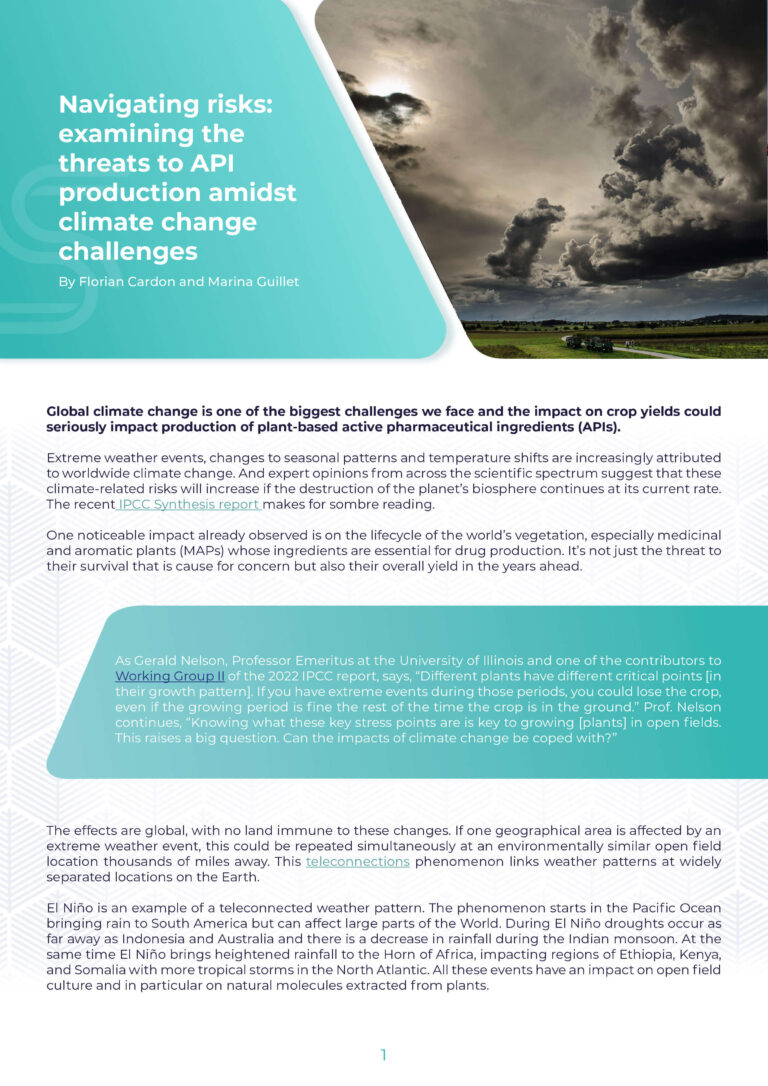
Navigating risks: examining the threats to API production amidst climate change challenges
16 January 2024
Experts are increasingly worried about the impact of climate change on medicinal plants. Increases in temperature could affect crop and metabolite yields which has implications for the pharmaceutical industry. In this article we look at some of the potential threats, such as the risk of medicinal activity reducing in these crops due to fluctuating temperatures.
https://samabriva.com/wp-content/uploads/2024/01/Navigating-risks_compressed.pdf

Scientific advances in plant bioproduction
This selection of journal articles highlights the most recent advances in the bioproduction of secondary metabolites using hairy root cell culture. You’ll find information on:
- advancements in metabolic engineering techniques
- the advantages of hairy root culture
- key research from the past decade
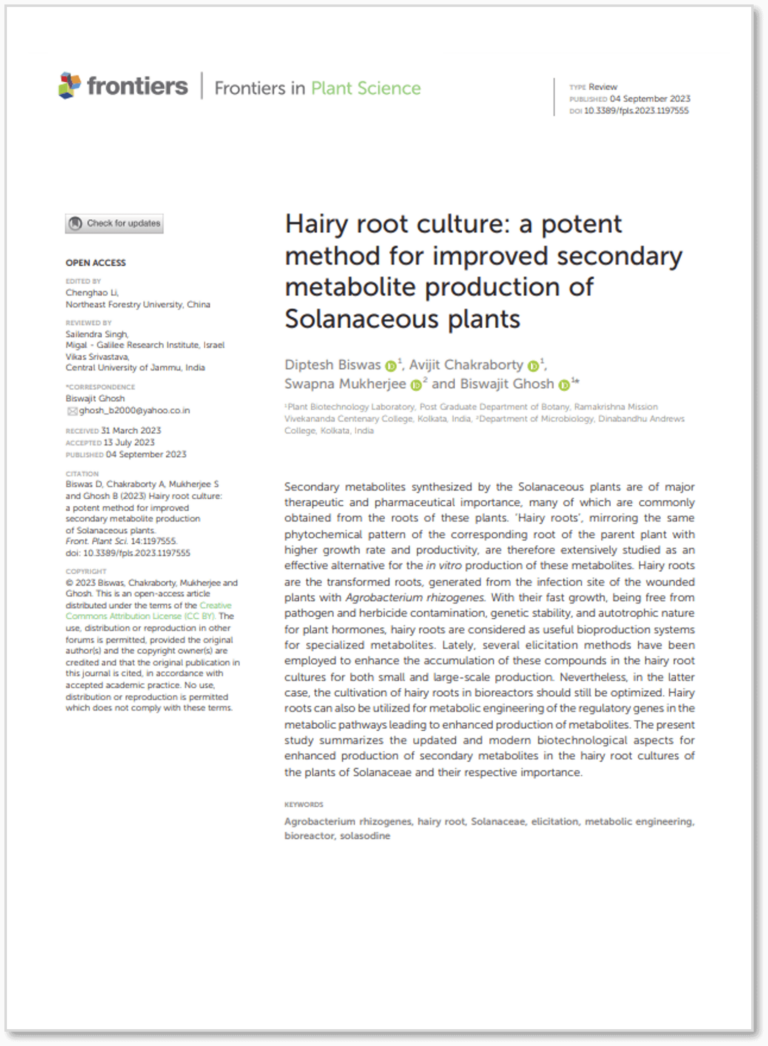
Hairy root culture: a potent method for improved secondary metabolite production of Solanaceous plants
Worryingly, more than 95% of the Solanaceous plants used for synthesizing secondary metabolites are still being collected from the wild. Published by Frontiers, this journal article explores how ‘hairy root’ culture systems offer a more stable and continuous production of secondary metabolites with higher yields.
https://www.frontiersin.org/journals/plant-science/articles/10.3389/fpls.2023.1197555/full
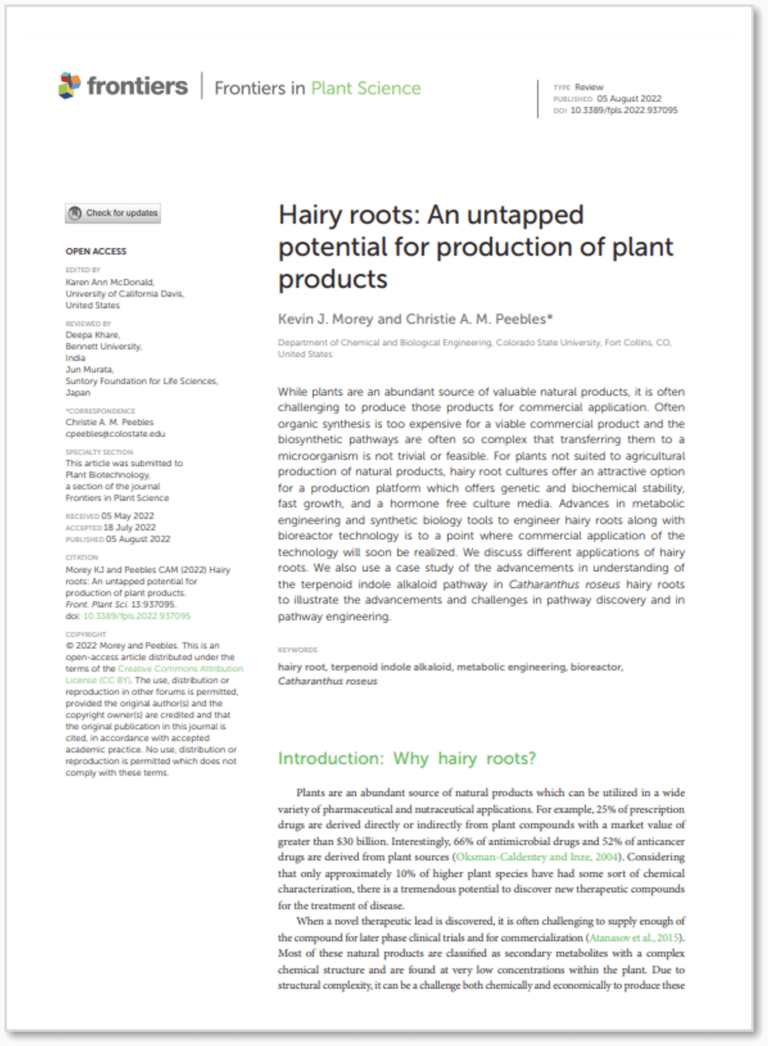
Hairy root culture: An untapped potential for production of plant products
Plants are a rich source of valuable natural products, but it can be challenging to produce these products for commercial application. Organic synthesis is expensive and the biosynthetic pathways are often too complex to transfer to a microorganism. Published by Frontiers, this journal article explores how ‘hairy root’ cultures are now an attractive option as a production platform.
https://www.frontiersin.org/journals/plant-science/articles/10.3389/fpls.2023.1197555/full
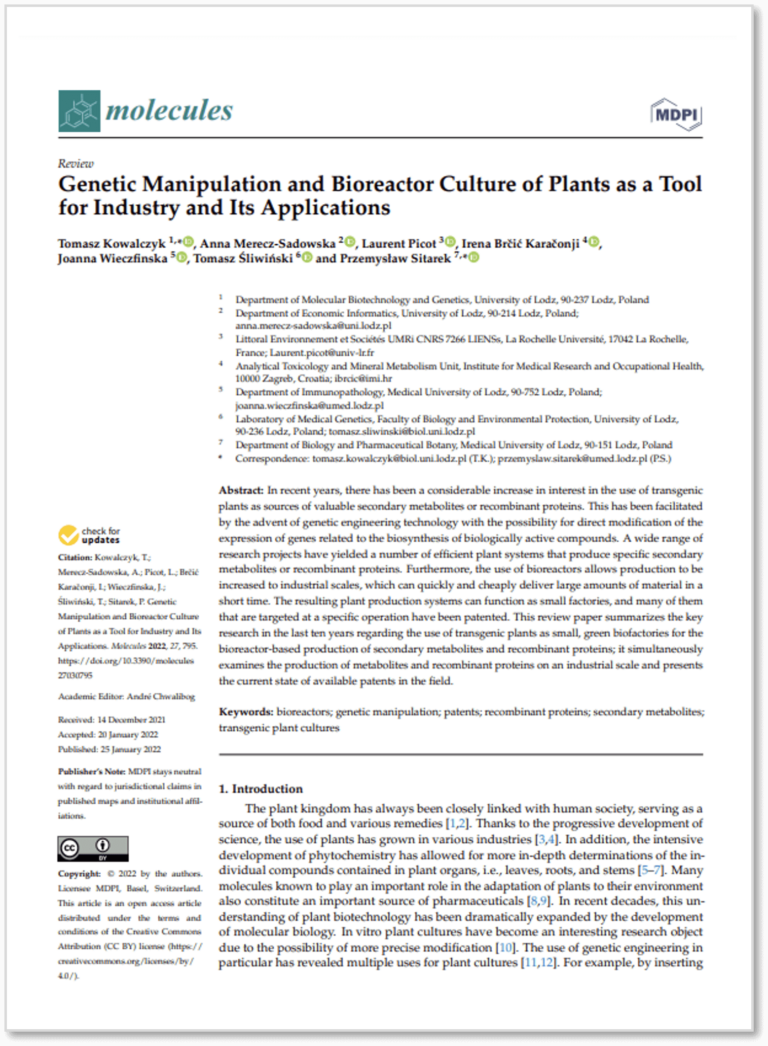
Genetic manipulation and bioreactor culture of plants as a tool for industry and its applications
Interest continues to grow in using transgenic plants as a source of secondary metabolites. Genetic engineering technology has produced plant systems that are efficient at producing specific secondary metabolites or recombinant proteins. Published by MDPI, this journal article details how research has shown that embracing plant systems and the use of bioreactors enables production to be increased to industrial scales, quickly and cost-effectively.
https://www.mdpi.com/1420-3049/27/3/795
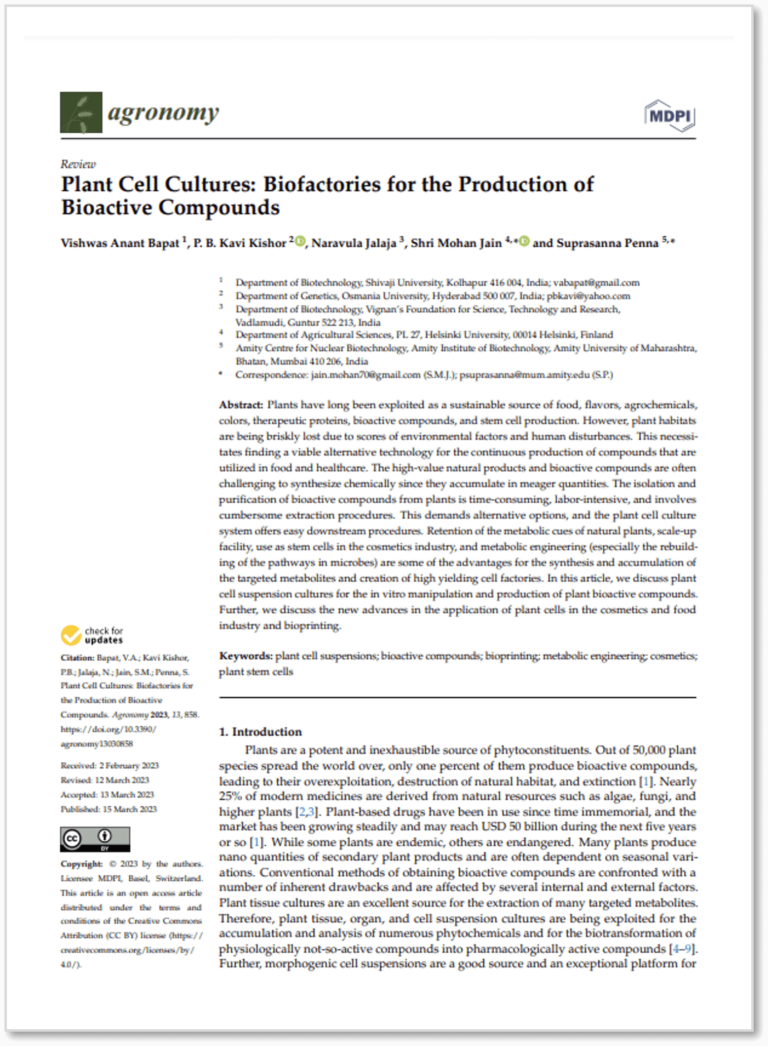
Plant Cell Cultures: Biofactories for the production of bioactive compounds
Alarmingly, plants that have long been exploited as a source of bioactive compounds are under threat. Their growing habitats are being rapidly lost due to environmental and human disturbances. Published by MDPI, this journal article looks at a viable alternative - plant cell culture systems. These make the isolation and purification of bioactive compounds from plants more stable, easily scalable and with higher yields.
https://www.mdpi.com/2073-4395/13/3/858
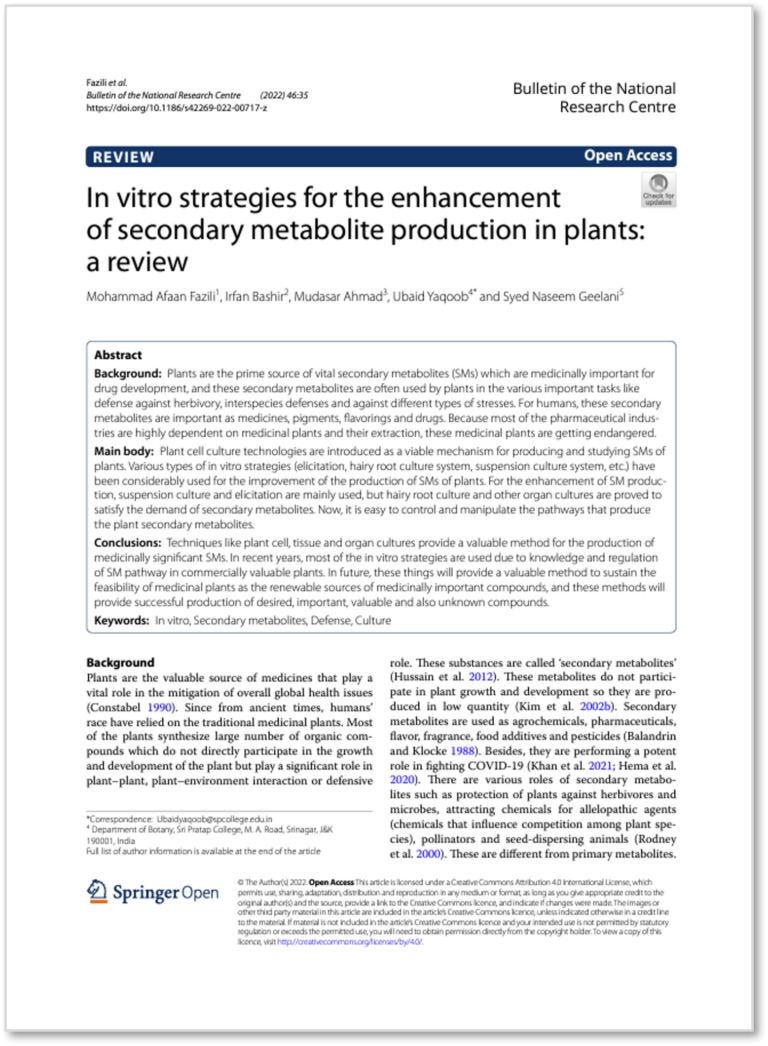
In vitro strategies for the enhancement of secondary metabolite production in plants: a review
Secondary metabolites synthesized by Solanaceous plants are of major therapeutic and pharmaceutical importance. Worryingly, field cultivation of these plants is becoming increasingly challenging due to geographical, seasonal and environmental variations. Published by MDPI, this journal article reviews hairy root cultures which offer an effective alternative for the in vitro production of these metabolites.
https://www.ncbi.nlm.nih.gov/pmc/articles/PMC8857880/
